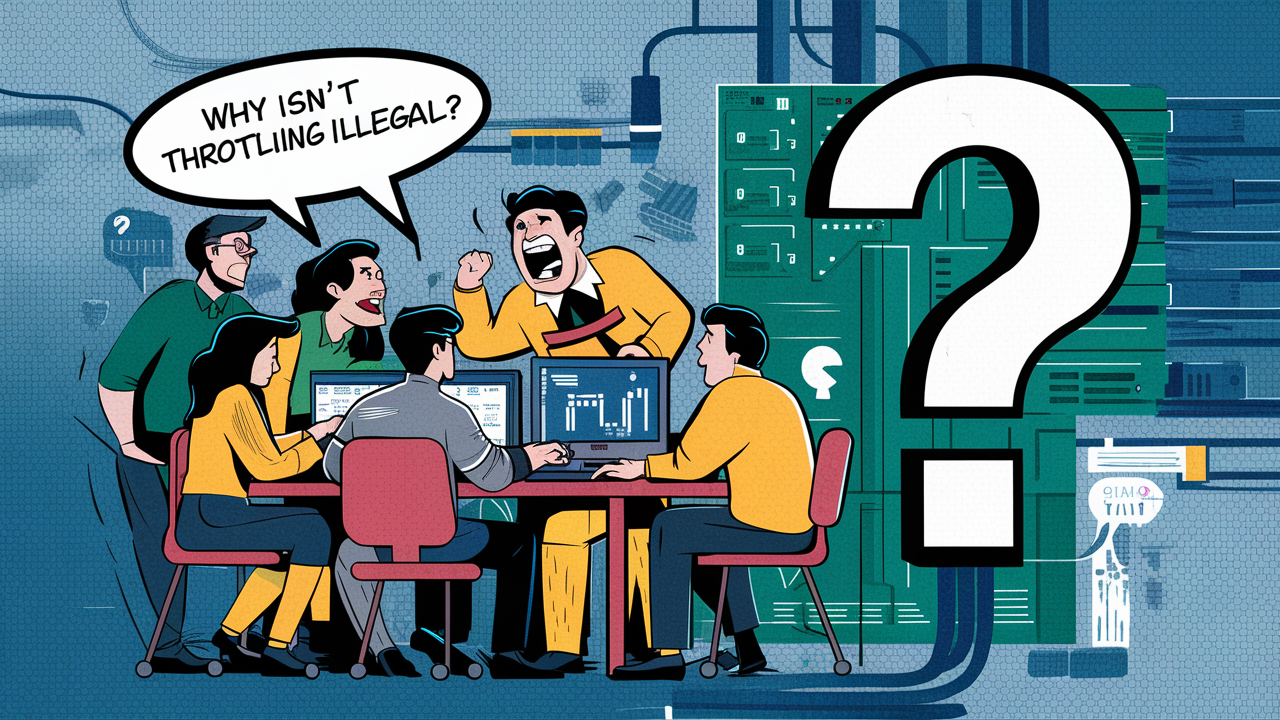Why isn t throttling illegal?

You are watching your preferred show on Netflix when without any warning the stream begins to buffer and can’t go back to the high quality. Or it is through signs such as being aware that your internet connection slows down to a crawl when attempting to download files. Annoying right? Possibly your internet service provider is slowing down your connection or throttling your internet connection. But if it affects your internet experience in such a negative manner, why is throttling allowable?
What is Throttling?
This is a process of deliberately limiting or reducing the speed of the internet service connection. ISPs like Comcast, AT&T, Spectrum and Verizon can throttle customers' internet connection speeds based on factors like ISPs like Comcast, AT&T, Spectrum and Verizon can throttle customers' internet connection speeds based on factors like:
- Network congestion – As many users access the Internet concurrently, or when the networks are congested, the ISPs alter their speeds to suit the available bandwidth.
- Data caps – this means that if a provider is offering you a certain amount of data per month, your connection can be slowed down if you exceed this amount.
- Particular cases - ISPs can recognize that apps with heavy bandwidth usage such as Netflix are in operation and then they can limit only that traffic.
It aims to decongest the network, which affects the speed and customer access negatively by providing a slower and interrupted experience.
Why Do ISPs Throttle?
There are a few reasons why your ISP might throttle your bandwidth: There are a few reasons why your ISP might throttle your bandwidth:
Money – Through limiting the use of bandwidth-intensive apps such as streaming of videos, the ISPs lower the costs in terms of the network and infrastructure they require. It also tries to make some of its clientele subscribe to other costly tariffs that offer larger data allowances to enable them to continue streaming without interruption.
Network management – The implementation of throttling ensures that the customers are still connected to the networks when the network becomes congested, though, at slower speeds. However, it helps to prevent the networks from getting fully congested.
Competition – In some situations, ISPs like Comcast which is a major provider of content delivery services to video streaming services deliberately slow down competitor video streaming services. This makes their streaming services seem superior, Retailers such as Amazon and Walmart are also benefitting from this zeitgeist, even though their streaming services are not as popular as Netflix, Hulu, or Disney +.
Savings on infrastructure costs – As anyone who has tried to build any sort of internet architecture can tell you, it’s very, very costly for the provider. The use of throttling also reduces their expenses by minimizing the infrastructure requirements that are used to address the traffic surges.
Is Throttling Legal?
In general – yes, throttling is legal according to the FCC and current net neutrality laws. Here's why:
In 2017, the FCC eased its previously stringent net neutrality rules. Those rules banned throttling and, as for the rest, declared that ISPs must treat all legal web traffic equally and without discrimination.
They argued that the existing rules hampered network development and progress on the part of the networks. They then dumped the plans in return for a deregulatory approach – assuming that ISPs would self-regulate against the practice of throttling.
But the new rules just allow ISPs to report information about throttling either publicly or when asked directly by the FCC. Therefore, throttling is legal if the providers have informed the customers about it. Some states have even passed their rules on net neutrality, but implementing them is still a challenge, for example, in California.
Unless the FCC bans intentional throttling, the major ISPs will not be subjected to any federal penalties or investigation of their conduct. For now, throttling stays legal and is actively used by them as and when they deem fit.
Should Throttling Be Illegal?
When used in an unfair manner or with no prior notice to the consumers, most of them view throttling as an unethical practice that fosters unfair competition. Moreover, in many countries, this is prohibited by laws, meaning that discrimination of networks cannot take place.
However, the providers argue that reasonable and minimal throttling is necessary as they must be able to offer reliable internet services to the population. Opponents argue that rules that overly regulate such network management would reduce innovation and investment more than benefit consumers.
Extremes are on both sides of public policy and there is a lot of sense in both. The problem regarding the formation of a middle-ground compromise agreement is still unachievable at present in the US market.
The FCC under the current administration in general favors the deregulation and that could shift depending on the court’s decisions on some court cases against recent orders by the FCC.
Other policy barriers and restrictions may also depend on the political sentiments regarding issues of network access as well as fairness once power changes in the DC. Hence, although throttling is still current and legal at present, a future rise in regulation of the practice is plausible.
Upgrade to faster, more reliable AT&T Fiber Internet today! Call us at +1 844-905-5002 and get connected with speeds that keep you ahead.